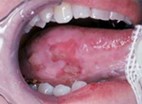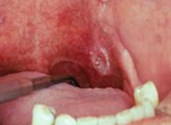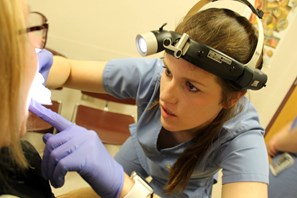Oral Cancer
What is oral cancer?
Oral cancer can develop anywhere in the mouth, including the throat and the lips. It often starts as an abnormal growth or sore that will not heal.
Cleveland Clinic defines it as:
Oral cancer (mouth cancer) is the broad term for cancer that affects the inside of your mouth. Oral cancer can look like a common problem with your lips or in your mouth, like white patches or sores that bleed. The difference between a common problem and potential cancer is these changes don’t go away. Left untreated, oral cancer can spread throughout your mouth and throat to other areas of your head and neck. Approximately 63% of people with oral cavity cancer are alive five years after diagnosis.
Detecting oral cancer early
- Visit your general dentist twice a year.
Share your medical history with your dentist, including any sexually transmitted disease diagnosis.
Ask your dentist to perform an oral cancer exam. - Perform a self-exam for oral cancer monthly. It is a two minute process that could could save your life!
Watch - American Association of Oral and Maxillofacial Surgeons Oral Cancer Self-Exam
Contact your dentist right away if you notice any abnormal growths, discoloration, tenderness, or bleeding.
What are symptoms of oral cancer?
- Sores or irritation that won't heal
- Red or white patches
- Pain, tenderness or numbness in mouth or lips
- Lump, thickening, rough spot, crust or small eroded area
- Difficulty chewing, swallowing, speaking or moving your tongue or jaw
- Change in the way your teeth fit together when you close your mouth


What are the risk factors for developing oral cancer?
- Tobacco use
- Nicotine use
- Alcohol use
- Sun exposure
- Gender (men are more likely than women to develop oral cancer)
- HPV diagnosis
The HPV vaccine can prevent 90% of cancers caused by HPV including oral cancers.
The HPV vaccine is recommended for all children ages 11-12 but can be given as early as age 9.
Anyone through age 26 should receive the vaccine if not already vaccinated.
Some adults aged 27 through 45 who are not already vaccinated might choose to get the HPV vaccine after speaking with their doctor about risks of HPV and benefits of vaccination.
How do dentists and hygienists screen for oral cancer?
An initial oral cancer screening should take fewer than five minutes. A patient does not have to do anything special to prepare for an oral cancer screening. The oral healthcare provider will inspect all parts of the inside of the mouth. They will look for irregularities on all sides of the tongue and underneath. The dentists or hygienists will feel tissues in the mouth and neck for lumps or abnormalities. Early detection from an oral cancer screening could lead to follow up care and testing.

